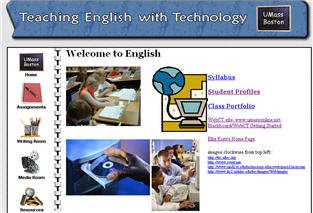Some general thoughts:
Yes, students absolutely need to be taught to question the validity and perspective of things online as much as they do anywhere else. I still firmly believe that a broad emphasis on critical thinking/reading will pay large dividends. That doesn’t mean not to focus it on specifics like websites of course. Before I wised up to it I had students saying in a PowerPoint that
I agree that a lot of what we read sounds dated, which emphasizes the importance of the skills we want students to develop over the content. Right now we live in a google-centric world, but it seems likely that google will continue to evolve and/or something else will come along. The point is, five years ago teaching students how AltaVista and Yahoo and Google searched differently was important, now it’s not. What is important is that students find out how these resources do their work.
Likewise, the process of searching for good relevant information is important. One point I’m not sure Kajder emphasizes (enough) is the importance of students knowing what they are looking for. Most of the websites that are easy to find on Othello or Animal Farm are in the SparkNotes mold (more on that later) and will be summaries, possibly with analysis and basic background information. Call me crazy, but I’m pretty sure that sending students to find summaries of literature isn’t the best use of the internet.
Assuming that students do know what they are searching for, it’s important to give them some basic practice with things like Boolean operators which will become even more important as they continue their studies (try putting “Shakespeare” into JSTOR, see how useful that is). Searches work so quickly now that knowing how to do some trial and error searches seems like the skill worth developing, as is knowing how to interpret those results. (As a side note, tabbed browsing is one of the greatest things to ever happen to me. You (or students) can just open a new tab, you never need to leave the search results page.)
Our library does a brief orientation for freshmen where they teach them the basics of the library, how to search the online catalogue, where reference books are, etc. One thing they don’t bother with is teaching students about some of the online resources we have. The school subscribes to a student-friendly version of Infotrac and a few resources like that. I haven’t looked extensively at all of these resources, but I do know that they’re intended for high school scholarship, which is more than I can say for SparkNotes.
The hypertext version of the McEnearney article utilizes much of the potential of hypertext as a medium. The setup actively encourages a reading that isn’t necessarily linear. I admire how much he goes out of his way to provide a format that isn’t a simple reproduction of the article (although he puts that up as well) and lets users choose their own path. Checking how the reader is doing so far and including a discussion forum are at the very least productive uses of a website.
Finally, I want to weigh in on SparkNotes. 95% of the time (no, that’s not based on actual scientific research) students use sites like that as a shortcut and nothing more. I don’t believe they have no merit, they just aren’t usually used to deepen understanding. One thing that feeds into our conversation is that students don’t recognize that SparkNotes is not directed at high school readers nor is it directed at people who don’t read the text and think critically about it. It can be helpful as a supplement to reading and interpretation, but fails miserably for anyone who relies on SparkNotes as a substitute for either of those. I generally check out what’s on there for anything I’m teaching both to get ideas and to try to be aware when students are using it. The quality I’ve found is pretty variable. Sometimes the focus is incredibly narrow (ie 1984 is all about Winston’s fatalism – what?!) or they give away the ending in the chapter 1 summary. The point is, I know and recognize that SparkNotes has a useful application, I just don’t believe my, or most, students use it for that purpose.

3 comments:
I think that you might find the work of Joyce Valenza interesting and useful as you think about critical literacy and a mindful use of websites. Her website: http://www.sdst.org/shs/library/ (look at making google go and several of the pathfinders that she has set up for kids to use).
First of all, am I correct in seeing that Sara Kajder responded to Jeremy? Very interesting! I just looked up the website Sara mentions above and I was so impressed. The information offered from that one website is umbelievable-Dozens and dozens of useful websites offering help and information for just about anything you can think of. I personally like all the quotation websites but I jotted a few other sites down that I want to check out at another time. I would suggest anyone who reads this to take a peak onto the website. I guarantee there is something for everyone.
Very cool! I'll add this site to our course reasources page on litandwriting.
Post a Comment